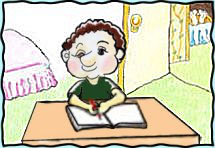| Compound nouns |
 |
Compound nouns are typically created by combining two existing words to make a new word:
These two nouns go together to make the word:
|
In this example both words are nouns, but it is also possible for an adjective and a noun to be combined (yellow + pages), or for a noun and a verb (baby + sit), or for a verb and a preposition (make + up). Occasionally, three words are combined to make one (video + cassette + recorder, or VCR as it is more commonly abbreviated).
In most cases, the compound noun is written as two words (Yellow Pages). Less commonly, compound nouns can be written as one word (homework). Occasionally, they can be written with a hyphen (ice-skating). If a student is not sure how the word should be written, a dictionary can usually help, but if in doubt, a useful rule of thumb is to write them as separate words. (There is a historical tendency in English for compounds to move from a two-word stage to an intermediate hyphenated stage, to a one-word stage. In addition, there is a tendency for some national varieties of English to move more readily to the one-word stage: a comparison of a British English dictionary with an Australian English dictionary will show spellings of compound words in the Australian dictionary to have moved further towards the one-word spelling than in the British dictionary.)
One very important feature of compound nouns is their potential for users of the language (especially learners) to create new words by combining almost any two nouns. For example, a student might save some food to be eaten only when doing homework; this might be called study-treat. Students enjoy being given the chance to be creative with language use, and compound nouns are a very rich resource.
With some compound nouns, the meaning is not immediately clear, even though the two words which make it up may be familiar. For example, there is no clue in either make or up to indicate that make-up means the creams and powders women use to decorate their faces. In these cases, students need to learn the compound noun as if it is a new word.
|
Tell me more ... |
|
||
To give us feedback about this section, click here or on the Comment button at the top of the screen.
If you have any questions about this section, visit the Language Corner.
If you have any questions or suggestions about how to teach this section, send a message to the Teaching Corner.